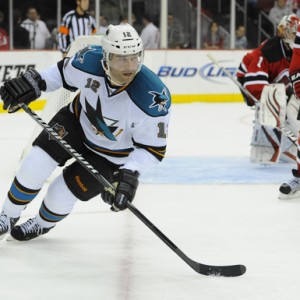Based on the last decade or so of NHL history, looking up and seeing the San Jose Sharks firmly entrenched in a playoff spot is hardly surprising.
After missing the postseason for the first time in 10 seasons in 2015, the Sharks are in a prime position to return to the chase for the Cup. Sitting in third in the weak Pacific Division with 67 points, well ahead of the fourth-place Coyotes — who have 60 points — the Sharks have a 98.5 percent chance of making the playoffs heading into Monday’s game against the Blues, according to SportsClubStats.com.
Additionally, sporting a 13-3-3 record in their last 19 games, the Sharks are one of the hottest teams in hockey, making a strong midseason surge up the totem pole.
Yet, it is difficult to quantify the season as a “success” or a “failure,” and perhaps that distinction won’t be made until either the Sharks stay true to their history make an early exit in the playoffs or go on the deep playoff run they have been long overdue for.
Because when you have a team that has consistently failed to live up to its potential, stubbornly stuck to the status quo, and hasn’t delivered results, a playoff appearance means little. As satisfying as this superb run of hockey over the last couple of months has been, you expect more.

For all the warranted criticism that General Manager Doug Wilson has received, he has done a commendable job of adjusting the roster this season without blowing everything up. Free agents Joel Ward and Paul Martin have been strong and necessary offseason additions. Rookie Joonas Donskoi is coming into his own as a promising winger. Dainius Zubrus has provided stability to the fourth line.
At the top, the Sharks’ core remains one of the most lethal in the league. Joe Pavelski is having a stellar first season as captain, and Brent Burns is one of the best offensive-minded defenseman in the game. Joe Thornton has shown little signs of aging. Patrick Marleau and Marc-Edouard Vlasic have been steady, and Logan Couture’s return from injury has given the team a boost.
The Sharks have shown they can compete with the elites, beating the Lightning, Panthers, Blackhawks and Blues on the road this month. A 4-3 overtime win over the Stars in January capped off a five-game win streak, and what once seemed like a large deficit separating them and the first place Kings in the Pacific Division has been whittled down to just five points, with Anaheim three points back.
Their stellar 20-9-2 road record — 13-3 against the East — ranks third in the league, and the newly-hired Pete DeBoer has proven to be a smart, stabilizing hire following the offseason mess surrounding the fired Todd McLellan.
Still, expectations this season are higher than simply returning to the playoffs — they’ve been there and done that way too many times to not bring home a Stanley Cup. With that comes the uncertainty of the consequences of how this season plays out, which makes this relatively successful campaign this far seem like a moratorium until ownership makes drastic changes.

Realistically, how many more times do the Sharks have to fall short until Wilson’s leash runs out? How many more disappointing playoff departures have to take place until Thornton and Marleau head out the door? These were talking points three or four years ago, and they remain hot topics today, regardless of the team’s current record or playoff status.
Thus, the pressure is on the Sharks to maintain the momentum they’ve built up and deliver an end result that makes fans and ownership look back at the season and call it a success. Maybe winning the Stanley Cup is a bit far-fetched, but losing in the first round to the Ducks or Kings definitely won’t do it. Without putting words in majority owner Hasso Plattner’s mouth, this is the situation the Sharks have placed themselves in as a result of their past failure: the point where success is now not simply requested, but demanded to prevent a potential major offseason blowup.
* Featured Image is by Amy Irvin / The Hockey Writers